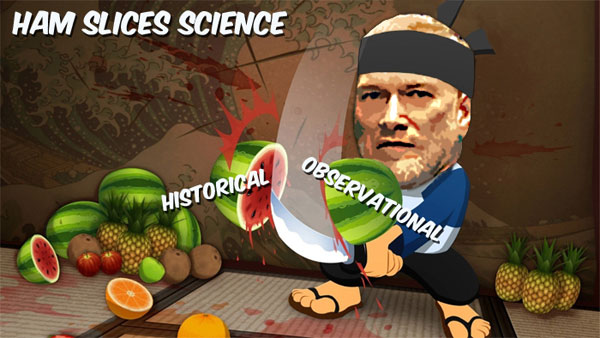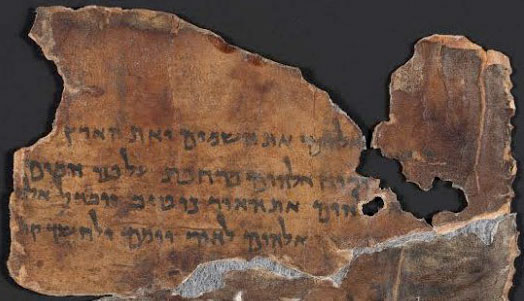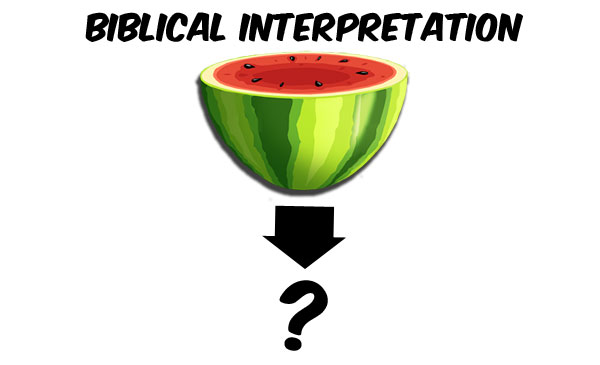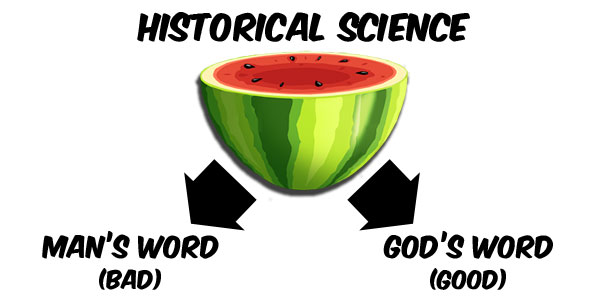As I’ve previously discussed, Ken Ham’s argument for Young Earth Creationism depends upon his slicing science into two kinds of science: historical and observational.

Ham contends that observational science, upon which everyone generally agrees, forms the basis of our modern technological accomplishments. But when it comes to historical science, Ham claims that we end up with profoundly different conclusions — for instance, evolution versus creation — because we’re analyzing the evidence from different worldviews. According to Ham, being a Christian (or a true Christian, anyway) means interpreting the historical scientific data through the Bible alone. If you’re not a Christian (or are simply a very misguided one), then you interpret the historical scientific data according to your own terribly flawed and sinful understanding.
To Ham, his interpretation of the historical evidence rests on God’s infallible Word, while everyone else’s interpretation of that evidence rests on their own utterly fallible assumptions. While Ham’s division of science is decidedly problematic (not to mention blatantly self-serving), there is a division to which all Christians really should pay attention: the text of the Bible and our interpretation of that text.

On the one hand we have the text of the Bible, written and collected and compiled and edited by many authors for many reasons over many, many years. Great! Unfortunately, we don’t have any of the original manuscripts of this supposedly infallible and inerrant text. We don’t have, for instance, the original manuscript of Genesis 1 as penned by Moses based on God’s dictation. And that’s not likely to show up anytime soon. What we do have are bits and pieces of very old parts of the Bible, such as this fragment from the Dead Sea Scrolls that contains the opening verses of Genesis:

But simply having such fragments tells us nothing. To accomplish anything meaningful with them, we must go about the crucial task of interpreting them. We must analyze and translate and contextualize and theorize and theologize them. If you can look at the above fragment from Genesis and immediately understand that God created the material universe in six twenty-four hour days exactly 6,000 years ago, then you are one giant step ahead of the rest of all humanity. We mere mortals must wrestle with the challenge of understanding the language, culture and context of ancient writings. And in so doing many of us find it wise to defer to the wisdom of scholars. So we have the text of the Bible — the raw surviving fragments of it — and we have the interpretation of that text. And they’re no more the same thing than a sack of flour is a bundt cake. Ken Ham is very clear about his understanding of “historical science” being based purely upon the Bible. But if Ham’s interpretation of “historical science” rests upon the foundation of an infallible Bible, what is the infallible foundation of his Biblical interpretation?

Quipping “there is a book” is all well and good. But if you want me to buy into your particular interpretation of that book, you’re going to have to tell me why your interpretation of it is worthy of being taken seriously. Simply saying that the Bible supports Young Earth Creationism, without also offering any evidence as to why you’ve decided upon that very peculiar interpretation of Genesis, amounts to nothing more than declaring, “The Bible says what I say it says because I say it says what it says!” Argument fail. If Young Earth Creationists want others to take their understanding of science and the Bible seriously, they’re going to have to move beyond kindergarten rhetoric and reasoning so circular it’s like being trapped in a giant hamster ball.
When I was a child, I talked like a child, I thought like a child, I reasoned like a child. When I became a man, I put the ways of childhood behind me. (1 Corinthians 13.11)
The question we all must respond to is not what we accept as authority, but why we accept it as authority. So, to Ken Ham and other YECers, I ask this question: What is the foundation of your Biblical interpretation? And I think that’s a question worth asking anyone who has any opinion about the Bible.
 Dan Wilkinson
Dan Wilkinson
Dan is the Executive Editor of the Unfundamentalist Christians blog. He is a writer, graphic designer and IT specialist. He lives in Montana, is married and has two cats.













